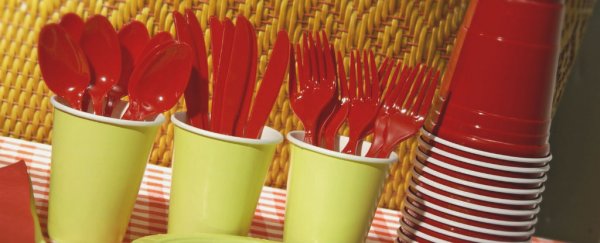France just passed a law that says all plastic plates, cups, and utensils will be banned by 2020, and replacements will need to be made from biologically sourced materials that can be composted.
The new law follows a total ban on plastic shopping bags in July, and is part of the country's Energy Transition for Green Growth Act - a plan to make France a world leader in adopting more environmentally friendly practices, and in reducing greenhouse gas emissions.
With 4.73 billion plastic goblets discarded in France in 2015 alone, and roughly 17 billion plastic bags used annually in supermarkets around the country, the new laws will hopefully put an end to France's dependence on disposable plastic wares.
According to the new law, the distribution of disposable plastic bags at supermarket check-outs has been banned as of July, and plastic bags will be prohibited in fruit and vegetable departments from 1 January 2017.
A ban on the distribution of disposable cooking utensils, cups, and plates will be enforced in 2020, which will give manufacturers time to adjust.
Local ministers stipulated that in three years' time, 50 percent of the material used to procure such items will have to be organic and compostable, and that proportion will rise to 60 percent by 2025.
The news has been welcomed by conservation groups around the world, and with predictions that by 2050, there'll be more plastic than fish in our oceans, is the kind of definitive action that's needed if we're going to have any chance of mitigating the problem of waste in a growing global population.
But not everyone is happy.
Samuel Petrequin from the Associated Press reports that Pack2Go Europe - a Brussels-based organisation that representing European packaging manufacturers - has announced that it will be fighting the new law, as it infringes on manufacturers' rights.
"We are urging the European Commission to do the right thing and to take legal action against France for infringing European law," Pack2Go Europe secretary general Eamonn Bates told the Associated Press. "If they don't, we will."
The organisation claims that the ban will actually make the country's litter problems worse, saying that consumers will think it's okay to leave the new biodegradable packaging behind in the countryside after use.
While that assumption is a bit of a stretch - especially coming from an organisation that represents the interests of plastic manufactures - there could be a real issue in terms of violating manufacturers' rights to make their plastic goods in peace.
As The Australian reports, manufacturers have complained that producing biodegradable cups and plates capable of containing hot food and drink is extremely difficult, and the technological know-how might not actually be up to scratch:
"Makers say the new products will be more expensive than existing ranges, prompting analysts to bet on a return of the traditional hamper with reusable crockery."
Bates also told the AP that there is no proof that bio-sourced disposable cutlery is more environmentally beneficial than regular plastic, and challenges the notion that the replacements will actually be compostable.
We likely haven't heard the last of the law and its various teething problems, but with reports that we're now making 20 times more plastic than we did 50 years ago - and mostly for packaging - and that production is expected to double again in the next 20 years, drastic measures might be all we have left.
Let's hope France can pull it off.
